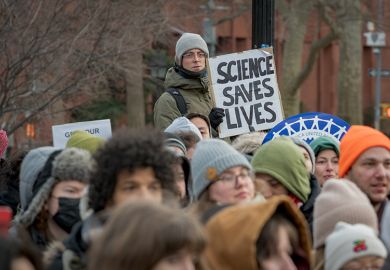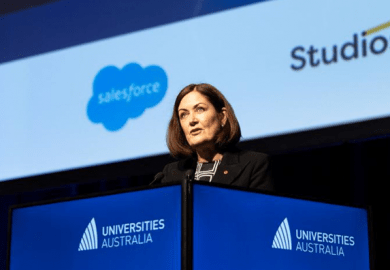“Grand challenge” research missions help to improve universities’ efficiency by marshalling their resources, management consultants have concluded.
Nous Group’s higher education principal Zac Ashkanasy said that rather than allowing a “free-for-all” of research topics, universities should muster their efforts around a handful of “overarching” themes such as climate change, intergenerational policy or defence and security, with “critical mass” in each.
“It allows a deeper investigation of what are very complex topics in society,” he said. “It also helps to foster greater interdisciplinarity. Complex topics are a web that requires a web of ideas and disciplines to solve things.”
An analysis by Nous’ benchmarking arm Cubane found that universities that focused on relatively few “rated research areas” had mostly performed well in the Excellence in Research for Australia exercise. Institutions assessed in 40 or fewer narrow disciplines generally bagged more “above world class” rankings than those involved in 50 or more.
Mr Ashkanasy said targeting research fields helped university administrators to allocate internal funds, select doctoral candidates and identify “superstar” recruits. “Do you…just give [grants] to whoever turns up and screams the loudest? Do you randomly poach academics in a topic that the university has absolutely no infrastructure and credibility around?” he asked.
“We need to build critical mass…on bona fide, [globally] important topics. If you’re a psychologist, biologist, economist, art historian or educationalist, your research shouldn’t be on random topic x. It should be geared towards answering a component of that overarching theme. If you diversify your interest too much, you become a master of nothing. Good organisations have focus, and they know what their strengths are.”
A counterargument is that the role of universities is to generate and disseminate knowledge, irrespective of its applications. “Some institutions can afford that more than others,” Mr Ashkanasy said. “If you’re letting a thousand flowers bloom, maybe it’ll work. It might not.
“We’ve got to have some boundaries around…our institutional focus and mission. We need about 80 academics working on [themes such as] climate change, [potentially] across quite different disciplines. You don’t need [them] completely intertwined with one another. They can still work in relative independence. But…we don’t want people working in isolation. We know that working together creates a better outcome for all.”
Nous has also identified a “macro trend” of Australasian universities improving their research efficiency by centralising support staff. “If you spread your research administration thinly, you end up with duplicate functions [and] different processes that don’t operate at scale,” Mr Ashkanasy said.
“The evidence is pretty strong now. If you want critical mass, good career pathways [and] a more efficient model, you centralise.”
This did not necessarily mean co-locating research support staff, he stressed. “But they report into the centre and [have] standardised processes and technology platforms.”
Register to continue
Why register?
- Registration is free and only takes a moment
- Once registered, you can read 3 articles a month
- Sign up for our newsletter
Subscribe
Or subscribe for unlimited access to:
- Unlimited access to news, views, insights & reviews
- Digital editions
- Digital access to THE’s university and college rankings analysis
Already registered or a current subscriber? Login








